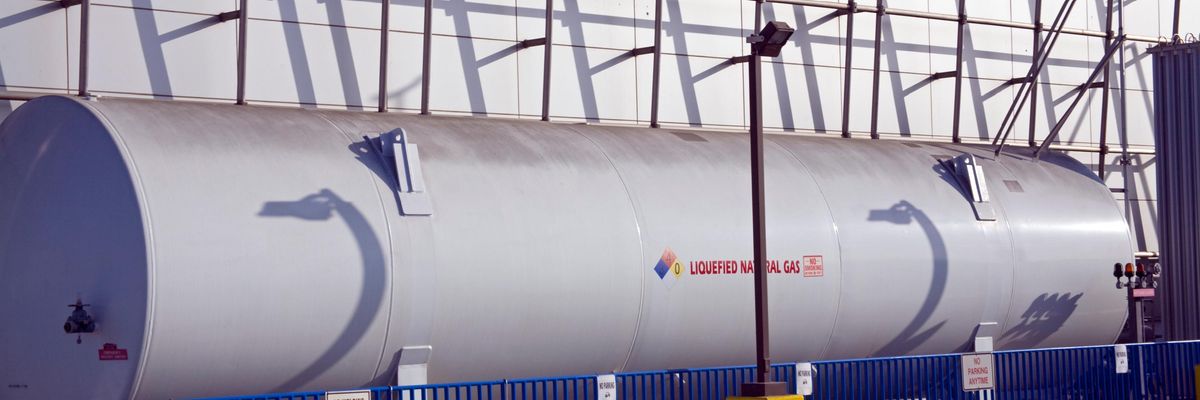Putin's tanks had barely crossed the border into Ukraine before the American Petroleum Institute (API) was out on Twitter attempting to exploit the crisis. Without even a word of solidarity for the people of Ukraine, API launched into a set of four demands for the White House, all of which would benefit the industry while providing no help to Europe or Ukraine.
We saw API and their allies in the GOP use the same playbook during the early days of the Covid-19 pandemic, when they issued a long list of demands for the Trump Administration, who was all too happy to turn the pandemic relief package into a multi-billion dollar handout to Big Oil.
This time, we can't let them get away with it. That starts with loudly and publicly debunking their arguments, and then pivoting to our own, real solutions to the energy issues surrounding the conflict and the ongoing climate emergency.
Many would argue that none of Big Oil's profits are legitimate considering the damage they're doing to the climate, but profits made off these global crises are especially ill-deserved.
First, API called on the White House to release permits for more drilling on federal lands. This is absurd. Nearly 13 million acres of public lands are already leased for oil and gas development and the industry has stockpiled thousands of unused leases they bought at rock bottom prices. The reason the industry wants more land isn't to rush oil and gas to Ukraine, but so they can claim more reserves and inflate their perceived value. It's a land grab pure and simple.
Second, since polluting on land isn't enough when you can also pollute on water, API called on the White House to issue a new five-year offshore leasing plan. The Biden Administration already made the mistake of holding the largest offshore lease sale in US history, but a judge threw it out because it lacked any meaningful climate analysis. Either way, it's never enough for Big Oil: they want a guarantee that they'll keep being able to expand in the Gulf of Mexico and beyond. How a five-year plan could possibly have any relevance to an immediate conflict is a mystery, but of course that isn't really the point.
Third, API demanded that the administration accelerate energy infrastructure permitting. This, of course, is the industry's answer to everything: when in doubt, build more pipelines. The energy infrastructure API is talking about isn't the solar panels and wind turbines that could help free us from our dependence on fossil fuels, but the pipelines, refineries and export facilities that will only deepen our addiction. API likes to pretend that more infrastructure will allow the US to somehow flood the global market with enough oil and gas that Putin won't sell any of his, but that's not how markets work. As long as the world is still reliant on fossil fuels, money will be flowing into the Putin regime.
Finally, API threw in the catch-all "reduce legal and regulatory uncertainty," a fancy way of saying, "make sure the rules don't apply to us." Big Oil doesn't like the idea of following the law, let alone being held accountable in court for the damage they've done to the climate. They're equally dismissive of regulations, also known as environmental and public protections, like the clean air and clean water acts. At this point, the industry can be pretty confident that their donations to Senators Manchin, Sinema, and the GOP have killed the most ambitious parts of Biden's Build Back Better Act, but one can never be too sure.
All of API, the fossil fuel industry, and the GOP's talking points during this crisis are based on the idea that they can fool the public into thinking that more US fossil fuel production will help Ukraine and harm Putin. In fact, it's the opposite. Current exports of US LNG to Europe are an important temporary measure since Europe is still hooked on gas, but it will never be a long term solution. That's because as long as there's a European and global demand for fossil fuels, there will be a market for Putin's poison.
What's needed right now is an all-out mobilization to break our global addiction to fossil fuels. Instead of building more fossil fuel infrastructure, the US should be collaborating with Europe and the rest of the world to supercharge the adoption of clean energy technologies. After all, that's what the European Union itself is calling for: early statements from the EU suggest that in part due to the crisis in Ukraine they're looking to embark on a major energy security plan based on efficiency and renewables.
What if oil and gas prices go up in the meantime? Instead of letting Big Oil continue to gouge consumers at the pump, the Biden Administration should take up an idea that's been gaining steam in the United Kingdom: implement a windfall profits tax on the oil industry and use the profits to offset the costs for consumers while investing in long-term solutions. The US already has programs like the Low Income Home Energy Assistance Program that could distribute the money in a progressive fashion that helped those most in need.
Big Oil made record profits last quarter not through any innovation of their own, but because of the Covid-19 pandemic and now the crisis in Ukraine. Many would argue that none of Big Oil's profits are legitimate considering the damage they're doing to the climate, but profits made off these global crises are especially ill-deserved.
And what better way for Democrats and the Biden Administration to respond to Big Oil's attempts to profit from this crisis than by making them help offset costs and pay for the transition away from fossil fuels? That would be a meaningful contribution from an industry that has long been a driver of conflict rather than an agent of peace.

